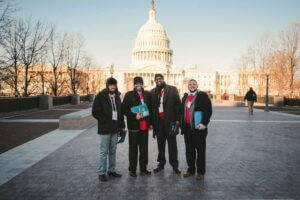Advocacy
In addition to efforts to increase funding for mentoring and enhance the criminal background check system, MENTOR advocates for and supports a variety of public policies that can advance quality mentoring programs.
-
Transition-to-Success Mentoring Act Transition-to-Success Mentoring Act
The Transition-to-Success Mentoring Act would establish a national competitive grant program for at-risk youth in middle school. The bill would allow local schools – on their own or through a partnership with a nonprofit organization – to pair at-risk students with a qualified mentor to help them navigate the transition from middle school to high school and address other academic, social and emotional challenges along the way. The Transition-to-Success Mentoring Act was introduced by Representative André Carson.
-
Mentoring in the Every Student Succeeds Act (ESSA) Mentoring in the Every Student Succeeds Act (ESSA)
MENTOR strives to improve the availability and quality of federal support for mentoring and tie it more closely with the important role mentors play in improving a young person’s outcomes in a range of settings, including their academic standing and learning environment. Quality mentoring has a proven positive impact on school attendance, relationships with adults, school connectedness and achievement. In the past, grants have helped local mentoring organizations start or expand school-based and out-of-school mentoring programs for youth with the greatest needs. As past grant monies have dried up, MENTOR has begun working with Congress and the U.S. Department of Education to find new opportunities in legislation and programs to support and expand quality mentoring for youth.
-
Foster Youth Mentoring Act Foster Youth Mentoring Act
On any given day in America, more than half a million youth are in foster care. Between 18,000 and 20,000 young people aged 16 and older “age out” of the foster care system each year, meaning that they face life on their own. Studies have found that within 12 to 18 months after leaving foster care the incidence of incarceration and public assistance is much higher for these youth than the general population. These young people desperately need a caring adult to stand by them through this difficult transition. MENTOR is working with legislators in Congress to try to reintroduce the Foster Care Mentoring Act which provides grants to quality youth mentoring programs to serve these youth who are nearing aging out of the foster care system.
-
Congressional Mentoring Caucus Congressional Mentoring Caucus
Members of Congress who are concerned about a particular issue often join together to form a caucus on that issue. A caucus will hold policy briefings, roundtable discussions, receptions and other events to keep members informed on key issues. Caucus members also often jointly advocate for passage of certain bills or amendments. By joining a caucus, a member demonstrates support and concern for a specific issue.
The bipartisan House Mentoring Caucus was formed in April 2002, originally under the leadership of Congressman Tom Osborne of Nebraska. After Rep. Osborne retired from Congress in 2006, new leadership took over. The co-chairs of the Caucus are currently Congresswoman Susan Davis of California and Congresswoman Betty McCollum of Minnesota.
House Republicans and Democrats are welcome to join the Congressional Mentoring Caucus, demonstrating that mentoring is not a partisan issue. Members who join are not committing to support any specific mentoring policies; rather, they are signaling that the issue of mentoring is of importance to them.
-
Youth PROMISE Act Youth PROMISE Act
The Youth Prison Reduction Through Opportunities, Mentoring, Intervention, Support and Education (PROMISE) Act focuses on the unique needs of communities to serve their at-risk and system-involved youth. Through PROMISE Coordinating Councils, representatives from law enforcement, parents, community-based nonprofits and faith-based organizations will work collaboratively to assess the communities’ needs and identify funding opportunities to support youth and prevent entrance into the juvenile justice system.


